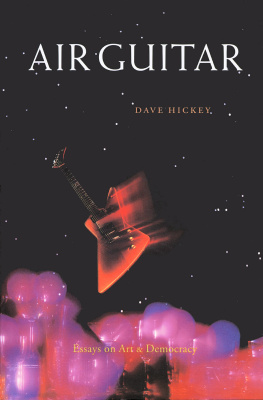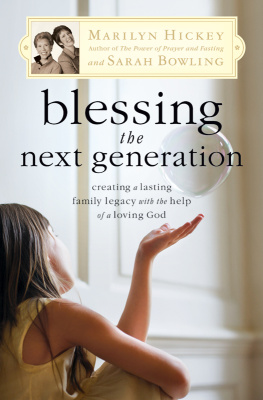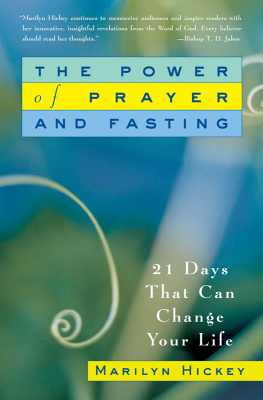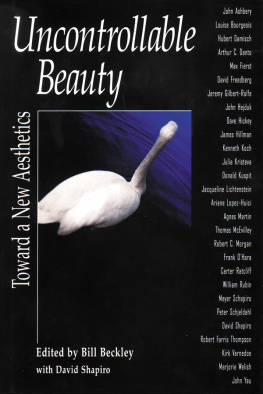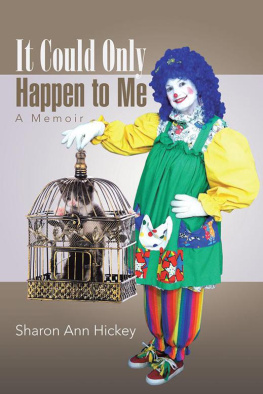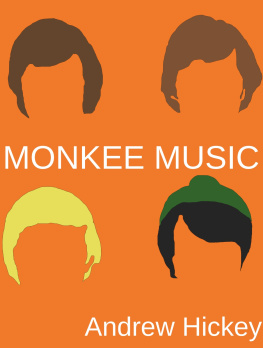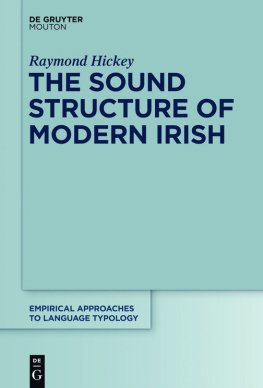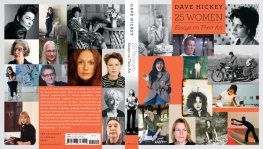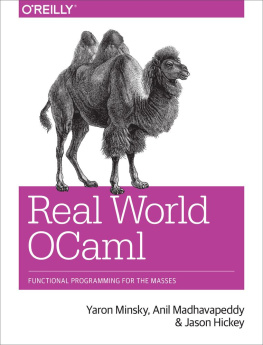Dave Hickey - The Invisible Dragon: Essays on Beauty
Here you can read online Dave Hickey - The Invisible Dragon: Essays on Beauty full text of the book (entire story) in english for free. Download pdf and epub, get meaning, cover and reviews about this ebook. year: 2009, publisher: The University of Chicago Press, genre: Art. Description of the work, (preface) as well as reviews are available. Best literature library LitArk.com created for fans of good reading and offers a wide selection of genres:
Romance novel
Science fiction
Adventure
Detective
Science
History
Home and family
Prose
Art
Politics
Computer
Non-fiction
Religion
Business
Children
Humor
Choose a favorite category and find really read worthwhile books. Enjoy immersion in the world of imagination, feel the emotions of the characters or learn something new for yourself, make an fascinating discovery.

- Book:The Invisible Dragon: Essays on Beauty
- Author:
- Publisher:The University of Chicago Press
- Genre:
- Year:2009
- Rating:5 / 5
- Favourites:Add to favourites
- Your mark:
- 100
- 1
- 2
- 3
- 4
- 5
The Invisible Dragon: Essays on Beauty: summary, description and annotation
We offer to read an annotation, description, summary or preface (depends on what the author of the book "The Invisible Dragon: Essays on Beauty" wrote himself). If you haven't found the necessary information about the book — write in the comments, we will try to find it.
The Invisible Dragon: Essays on Beauty — read online for free the complete book (whole text) full work
Below is the text of the book, divided by pages. System saving the place of the last page read, allows you to conveniently read the book "The Invisible Dragon: Essays on Beauty" online for free, without having to search again every time where you left off. Put a bookmark, and you can go to the page where you finished reading at any time.
Font size:
Interval:
Bookmark:
THE INVISIBLE DRAGON
ESSAYS ON BEAUTY
REVISED AND EXPANDED
DAVE HICKEY
The University of Chicago Press
Chicago and London
The University of Chicago Press, Chicago 60637
The University of Chicago Press, Ltd., London
Revised and expanded edition 2009 by The University of Chicago
Original edition 1993 The Foundation for Advanced Critical Studies
Text 2009, 1993 Dave Hickey
All rights reserved. Published 2009.
Paperback edition 2012
Printed in the United States of America
21 20 19 18 17 16 15 14 13 12 4 5 6 7 8
ISBN-13:978-0-226-33318-2 (cloth)
ISBN-13:978-0-226-33319-9 (paper)
ISBN-10:0-226-33318-3 (cloth)
ISBN-10:0-226-33319-1 (paper)
ISBN-13:978-0-226-01438-8 (e-book)
The Invisible Dragon was originally published by Art Issues Press in 1993. For permission to reprint, please contact the Permissions Office, The University of Chicago Press, 1427 East 60th Street, Chicago, IL 60637.
Library of Congress Cataloging-in-Publication Data
Hickey, Dave, 1940
The invisible dragon : essays on beauty, revised and expanded / Dave Hickey.
p. cm.
ISBN-13:978-0-226-33318-2 (cloth : alk. paper)
ISBN-10:0-226-33318-3 (cloth : alk. paper)
1. Aesthetics. 2. ArtPhilosophy. I. Title.
N70.H47 2009
701.17dc22
2008041463
 This paper meets the requirements of ANSI/NISO Z39.48-1992 (Permanence of Paper).
This paper meets the requirements of ANSI/NISO Z39.48-1992 (Permanence of Paper).
This edition of The Invisible Dragon is for Glenn Schaeffer
Connoisseur, littrateuran invisible dragon himself
Laimable sicle o lhomme dit lhomme, Soyons frres, ou je tassomme!
Guillaume Pigault-Lebrun (17531835)
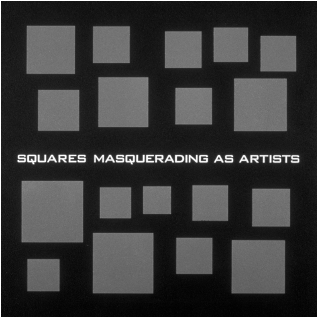
SCOTT GRIEGER Squares Masquerading as Artists
ACRYLIC ON PANEL, 1997.
COURTESY OF THE ARTIST AND THE JUDY VIDA AND STUART SPENCE COLLECTION.
CONTENTS
Dragon Days: Introduction to the New Edition
We grow rusty and you catch us at the very point of decadenceby this time tomorrow we might have forgotten everything we ever knew.
Tom Stoppard, Rosencrantz and Guildenstern Are Dead, act 1
First, understand this. The four essays that open this book are not characteristic of his writing. They are perfectly sincere, and he still believes everything he wrote in these essays. He just cant believe he wrote them. He imagines himself a teddy bear, the master of the sleepy wave. Usually, when he writes, he keeps a relaxed hand on the rein, the better to veer out of control at the slightest provocation. The four essays that open this bookwritten in response to great provocationnever veer. Tendrils of black smoke curl from between the words. Whiffs of bad juju rise from the pages. Their ambience of hallucinated intensity and icy aggression is, perhaps, not that forgiving of everyday human fecklessness. For this reason, he took The Invisible Dragon out of print many years ago, and he only offers the four initial essays now, somewhat polished, in tandem with a fifth, American Beauty, that is calmer, more capacious, and less scolding in its tone. This essay veers where it wishes to infer a history for the Wests long, pagan romance with beautiful things.
The actual occasion for his writing anything about beauty was the plague of intellectual dishonesty that infected every aspect of the controversy surrounding the public exhibition of Robert Mapplethorpes beautiful, pornographic photographs. Everybody involved in this cringe-inducing scandal lied like bandits and cloaked themselves in bright mantles of hypocrisy. Everyone had a dog in the fight. Everyone had money on the line. The critic only joined the fray because Robert Mapplethorpe had been a pal of his in the old downtown days. Being dead, Robert couldnt speak for himself. Being idiots, his defenders couldnt even defend themselves, so the critic stepped in on his friends behalfmostly just to acknowledge him in all his unreconstructed wickedness.
Appalled at the congeries of whiners, he wrote Enter the Dragon to clear the air of cant. He couldnt do it. He wrote Nothing like the Son for a magazine in Zurich because no one had written a serious piece of art criticism about Mapplethorpes X Portfolio. The magazine declined to publish the essay with the images he submitted. He resorted to the lecture hall. He wrote Prom Night in Flatland for a feminist magazine in Cologne because he is a feminist. After the Great Tsunami was written as homage to Gilles Deleuze, who was under the weather at the time. All of these essays occasioned anger and exasperation. Tempers flared. Things turned nasty at the intersection of art and politics. He tried to function throughout as he always has, as an art critic.
Even so, long before The Invisible Dragon was a book, he faced the real possibility of being shot by both sides in the culture war. His writing aroused genuine personal rancor, and this was distressing because he is not a personal person. He is, in fact, a third-person person who writes art criticism because it is third-person writing. Now people actually hated him (the word loathsome was bandied about). The sudden attention was as shocking as the hostility. He had been purveying unfashionable opinions for twenty years, relying on charm and equanimity. Now, even good-heartedness was failing him. People were trying to shout him down, and he was tempted to let them. What did he care?
Hitherto, his transit through the beaux-arts milieu had been virtually clandestine. He was there for the art. He appeared, when he appeared, in print. He talked with his fellow critics on the telephone. He had lunch with artistsbut never dinner, except at galas and dinner parties. Occasionally, he sought the counsel of art dealers like Leo Castelli, whom he knew and respected from his own days as a New York art dealer in the sixties. Otherwise, he kept to himself, and, before laffaire Mapplethorpe, things were fine. He lived at the beach, five hours south of Los Angeles, light-years from the snowbound fortresses of the burgeoning theory industry. He held himself apart from art world entanglements lest he be tempted to hold his tongue out of friendship or obligation. He wrote essays in the modest tradition of Hazlitt, Lamb, De Quincey, and Wilde about the way art objects looked.
The hostile response to the essays that would become The Invisible Dragon, however, made him anxious about his ability to secure employment. Since he never worried about anything, really, except living in cool places, this anxiety made him feel like an aging sissy. And feeling like an aging sissy reignited the rock-and-roll spark in his rebel heart. If he was going down, he resolved, he was going down spunky, guns blazing. So he got youthful and wrote The Invisible Dragon for the same reason he had written so many snotty rock-and-roll songs when his hair was long. Even so, he never imagined that a slim volume, published in the Hollywood Hills, out of Gary Kornblaus extra bedroom, had the slightest chance of making a dent. Nor did he care. He thought of The Invisible Dragon as an oldies concert, played for the sheer joy of cranking up the amps one more time.
Today, he likes to think that the spit and clatter of the Rolling Stones Respectable provides a pretty accurate aural equivalent to The Invisible Dragon, and, as a rock-and-roll song, the Dragon was a successful book. It appealed to children and other adepts of ecstasy. He signed and dedicated books to Chantoozie, Rip Nu 1, and Burp Daddio, among others. In the
Next pageFont size:
Interval:
Bookmark:
Similar books «The Invisible Dragon: Essays on Beauty»
Look at similar books to The Invisible Dragon: Essays on Beauty. We have selected literature similar in name and meaning in the hope of providing readers with more options to find new, interesting, not yet read works.
Discussion, reviews of the book The Invisible Dragon: Essays on Beauty and just readers' own opinions. Leave your comments, write what you think about the work, its meaning or the main characters. Specify what exactly you liked and what you didn't like, and why you think so.

